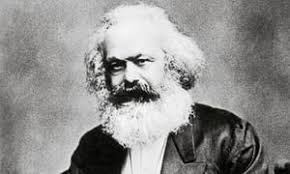
By Jake Hollis
Note: Communism and socialism are treated as synonymous in this article as they were by Marx and Engels. What is today termed ‘socialism’ (free healthcare, basic income, free education, and so on) will be called ‘social-democracy’ or ‘the welfare state.’
The title “Communism as Critiqued by Marx” may seem wrong—it is not. But shouldn’t it be like “Communism as an Idea from Marx”? Not at all. To use Marx’s own biting words against philosophers, Marx didn’t “have the solution of all riddles lying in [his desk], and the stupid, exoteric world had only to open its mouth for the roast pigeons of absolute knowledge to fly into it” (Marx, 1843). On the contrary, communism was the emergent result of a “ruthless criticism of all that exists” (ibid.), including socialism.
The fundamental results of such criticism were laid out in an 1852 letter from Marx to a J. Weydemeyer, nine years after setting out on his “ruthless criticism”:
“… [A]s to myself, no credit is due to me for discovering the existence of classes in modern society or the struggle between them… What I did that was new was to prove: (1) that the existence of classes is only bound up with particular historical phases in the development of production, (2) that the class struggle necessarily leads to the dictatorship of the proletariat [meaning the working class—JH], (3) that this dictatorship itself only constitutes the transition to the abolition of all classes and to a classless society.” (Marx, Marx to J. Weydemeyer, 1852)
What are the key ideas that stand out from Marx’s conclusions? In my reading, the fundamental line of continuity within these three conclusions is the notion of class society’s self-abolition: that capitalism, by its own laws, (1) exhausts its ability to continue profit-making, and (2) exponentially produces a mass of propertyless workers who seek to liberate themselves, a liberation which can only occur coinciding the abolition of capital and of all class systems (cf. Chapter 4 of The Holy Family and The Principles of Communism).
From here, it would help to refer ourselves to Marx and Engels’ The German Ideology, which decidedly states:
“Communism is, for us, not a state of affairs which is to be established, an ideal to which reality [will] have to adjust itself. We call communism the real movement which abolishes the present state of things. The conditions of this movement result from the premises now in existence.” (Marx & Engels, The German Ideology, 1845)
To reiterate this point, communism can express two things: either “the real movement which abolishes the present state of things” (the proletarian revolution against capital) or the subsequent mode of production which “[results] from the premises now in existence” (that which capitalism is leading to). We will see that these—the subjective factor of workers and the objective factor of capitalism’s self-destructive production—are one and the same later. For now, let us sketch out the path of inquiry Marx followed, that path which led him to his theories.
Throughout my personal readings of Marx and Engels’ works and with some guidance offered by Karl Korsch’s 1923 work, Marxism and Philosophy, I see it is best to give the following outline of Marx’s initial critiques:
- Marx followed Feuerbach’s trend of reversing Hegel’s notion of alienation;
- Marx critiqued Feuerbach’s materialism and unified critical theory and revolutionary practice (cf. Theses on Feuerbach);
- Marx discovered the proletariat as the rightful heirs of German Idealism (cf. The Economic and Philosophic Manuscripts, The Holy Family, and The German Ideology); and
- Marx continued to dedicate his life to studying the class struggle, the result of which can only end in the victory of the proletariat over the bourgeoisie or barbarism (1845 and on).
Next, we will introduce Georg Hegel, Ludwig Feuerbach, and Marx’s relation to their philosophic systems, detailing points one and two.
